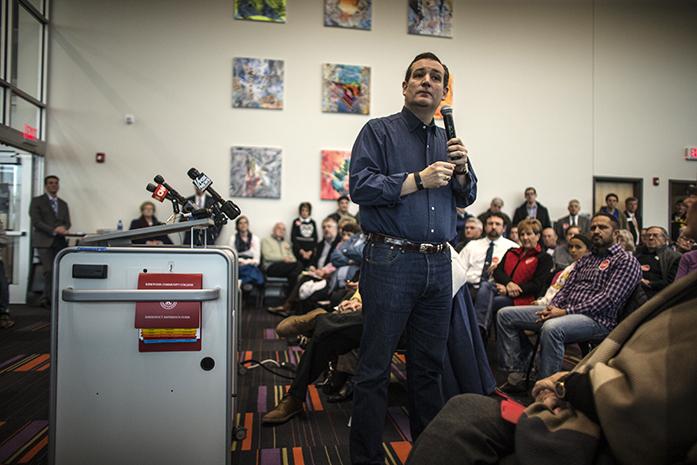After months of lobbying, the Environmental Protection Agency announced a slight increase in the amount of renewable fuels that are required to make up the nation’s supply. But the ultimate prize for ethanol advocates lies in a far different realm for 2016.
Following such a focus, an Iowa-based ethanol group went on the attack Tuesday against a rising Republican presidential candidate — just one day after EPA’s announcement.
American’s Renewable Future, a group pushing to keep the Renewable Fuel Standard, hammered away at Texas Sen. Ted Cruz for being a “hypocrite.”
“Sen. Cruz has been very opposed to the [Renewable Fuel Standard], he has been a very anti-ethanol and anti-[fuel standard] member of Congress,” said Majda Sarkic, communications director for America’s Renewable Future. “At the end of the day, he has refused to learn about this issue.”
Cruz has risen in surveys of Iowa caucus-goers, which Sarkic said played into the group’s decision to launch its most aggressive ads of this cycle.
According to the Des Moines Register, Cruz’s campaign has asked for the ad to be taken down.
The outfit previously targeted retired neurosurgeon Ben Carson in digital ads. Carson, Cruz, and Kentucky Sen. Rand Paul did not receive high ratings on America’s Renewable Future midterm report card.
Another stakeholder in Iowa’s ethanol industry said its goal is to help educate candidates one of whom would have a large say about its future should he or she be elected the next president.
“I think every candidate everyone comes from a different place,” said Monte Shaw, executive director of the Iowa Renewable Fuel Association. “For us it is not about trends or groups, a candidate comes to understand the need for the [fuel standard].”
Congress started what became the Renewable Fuel Standard in the early 2000s before expanding and enshrining in in a 2007 law. The Energy Independence Security Act of 2007 mandates a percentage of the U.S. fuel supply must be blended with renewable fuels, including corn-based ethanol and next-generation sources such as corn cobs or switchgrass. The yearly requirements continue to increase until 2022 when 36 billion gallons of the fuel supply would need to come from renewable sources.
While the fossil-fuel industry has long criticized the mandate tensions reached new heights in 2013 when the EPA proposed standards below those required by the law.
The first-term Texas senator led Carson by 5 percentage points in a Quinnipiac University Poll of likely Republican caucus-goers conducted from Nov. 16 to 22 with a 4 percent margin of error. Both candidates still trail Donald Trump.
Interest groups like America’s Renewable Future, have long been a part of the caucus experience. But on the heels of the EPA proposals, and with a contested race on both sides, Iowa political watchers say the efforts have been expanded for this cycle.
Despite the renewed pressure, Will Rogers, the chairman of the Polk County Republicans dismissed any notion of Iowans refusing to support someone a candidate such as Cruz whose is skeptical of the standard.
“Traditionally, it is not a single issue,” said Rogers who oversees the party for the state’s largest county.
In the event a candidate opposes the standard, Rogers said, Iowans might be willing to overlook such a position if there is a clear reason why a hopeful is against the standard.
Sarkic said the group will issue one final report card of the Republican and Democratic hopefuls in January along with paid media and grass-roots organizing before the Feb. 1 caucuses.
In the past, Cruz has said he opposes government involvement in renewable energy. He also refused to evolve or change his position — unlike some of his fellow candidates.
Another player in Iowa’s renewable fuel industry said they understand candidates need to be educated about the standard, but what he or she says on the campaign trail is what matters the most.



